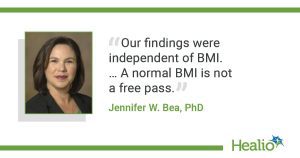Early age at menarche, early age at menopause and the use of oral contraceptives can increase the risk for developing type 2 diabetes by as much as 33%, according to study data presented at the European Association for the Study of Diabetes annual meeting.
“A longer exposure to endogenous sex hormones that occurs late in life, as well as breastfeeding, were associated with a lower risk for developing type 2 diabetes, independently of classical risk factors,” Sopio Tatulashvili, MD, of Avicenne Hospital in Bobigny, France, told Endocrine Today. “The longer duration of menstrual cycles and use of contraceptive pill were associated with a higher risk for developing type 2 diabetes.”
Tatulashvili and colleagues analyzed data from 83,799 French women who participated in the Etude Epidemiologique de Femmes de la Mutuelle Générale de l’Education Nationale (E3N) prospective study and were followed between 1992 and 2014. Researchers used Cox multivariable models adjusted for BMI, smoking, age, physical activity, socioeconomic status, education, family history of diabetes and blood pressure to estimate HRs for hormonal factors and type 2 diabetes risk.
Researchers found that women with menarche at age 14 years or older were 12% less likely to develop type 2 diabetes when compared with women with menarche at age 12 years or younger (HR = 0.88; 95% CI, 0.81-0.95). Similarly, women with later onset of menopause (aged at least 52 years) were 30% less likely to develop type 2 diabetes vs. women who began menopause earlier (aged 47 years or younger; HR = 0.7; 95% CI, 0.63-0.78).
Compared with women who were never breastfed, women who were breastfed had a 10% reduced risk for developing type 2 diabetes (HR = 0.9; 95% CI, 0.85-0.95). Additionally, an increase in number of lifetime menstrual cycles ( 470 vs. 390) was associated with a 25% reduced risk for developing type 2 diabetes (HR = 0.75; 95% CI, 0.68-0.82). Longer duration between menarche and menopause ( 38 years vs. 31 years) was associated with a 34% decreased risk for developing type 2 diabetes (HR = 0.66; 95% CI, 0.61-0.73).
In contrast, women who reported using contraceptive pills at least once were 33% more likely to develop type 2 diabetes when compared with women who reported no contraceptive pill use (HR = 1.33; 95% CI, 1.25-1.42). Women who reported longer intervals between menses ( 32 days vs. 24 days) were 23% more likely to develop type 2 diabetes when compared with women with shorter intervals between menses (HR = 1.23; 95% CI, 1.07-1.41).
“According to our study, breastfeeding could be promoted and the use of contraceptive pills could be more prudent, especially among women who already present classical risk factors for type 2 diabetes,” Tatulashvili said. “However, further studies are needed before the clinical implication of our study results.” – by Regina Schaffer
Reference:
Tatulashvili S, et al. Abstract 552. Presented at: European Association for the Study of Diabetes Annual Meeting; Sept. 16-20, 2019; Barcelona, Spain.
Disclosure:Tatulashvili reports no relevant financial disclosures.
This content was originally published here.








